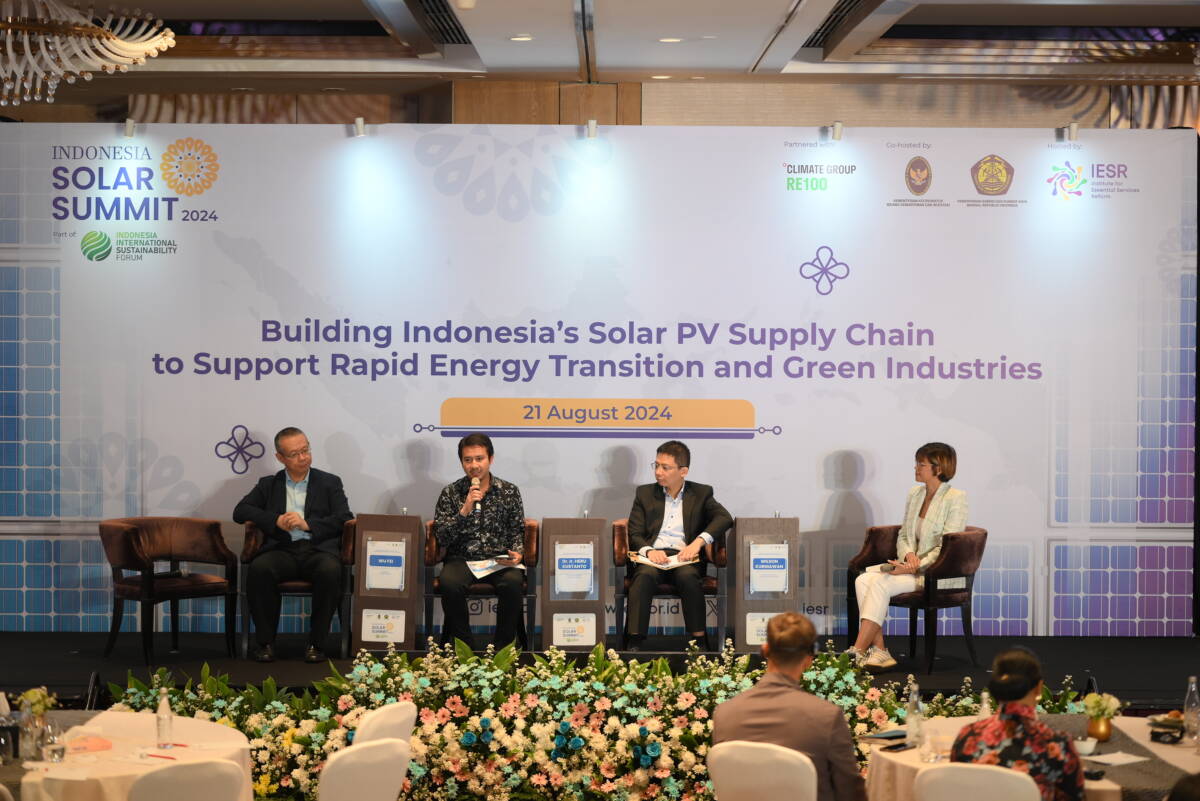Jakarta, August 21st 2024 – The solar power industry in Indonesia still faces a number of challenges, including low demand and lack of investment. The need for clear policy support to accelerate the development of the solar industry to reach gigawatt scale in Indonesia was the main discussion at the 2024 Indonesia Solar Summit (ISS).
Dwi Hadiyatmoko, Business Meeting and Planning Team, P3DN Center, Ministry of Industry explained that currently there are 18 solar panel companies operating in Indonesia, and have a Domestic Component Level (TKDN) content of 47 percent. The biggest challenge for the Indonesian solar industry is because the supply chain of the solar power industry is not yet fully in Indonesia.
“We still have to improve technical performance such as solar modules. Indonesian solar module manufacturers who are members of the Indonesian Solar Module Manufacturers Association (APAMSI) produce modules with 16 percent efficiency with a capacity of 450 Wp, the current module requirement is 21 percent efficiency with a module size of 600 Wp, meaning that existing products do not meet market needs. Investment is needed to improve this quality,” he said.
From the industry player’s side, Wilson Kurniawan, Chief Finance Officer (CFO) of Trina Mas Agra Indonesia acknowledged that there are still a number of challenges for the manufacturing industry.
“Some policies that need to be pushed immediately by the government are the expansion and acceleration of demand execution, acceleration of the solar panel class industry supply chain, and protection of local industries from the government,” said Wilson.
Indonesia’s position as a country with an emerging economy is a special attraction for investors. Wu Fei, Chairman of Suntech Power stated that Indonesia will be a very large (solar energy-ed) market.
“To meet the government’s requirements for 60 percent local content known as 60 percent TKDN, we decided to build a factory locally in Indonesia with several materials that we brought from various places,” explained Wu Fei.
Grant Hauber, Energy Finance Advisor, Institute for Energy Economics and Financial Analysis (IEEFA) reminded that Indonesia should not be trapped only on the agenda of growing the solar panel industry in Indonesia, the key factor that must be ensured is the procurement of definite projects.
According to him, this demand has not yet existed in Indonesia. He said that the methods that the government can take include, (1) moving industries such as RE100 and customers to get clean electricity, (2) streamlining the procurement process by eliminating PLN’s share ownership, (3) standardizing procurement projects (Indonesia needs hundreds of projects, not units), (4) realistic TKDN, focusing on the total percentage of the costs provided.
Norasikin Ahmad Ludin, Solar Energy Research Institute (SERI), Universiti Kebangsaan Malaysia stated that solar energy will be the mainstay of meeting energy needs in the future.
“Malaysia is expected to experience an increase in electricity demand of four percent, we are looking for various alternative ways to meet this energy need. The government (Malaysia-ed) is targeting 21 percent renewable energy by 2025, as many as 18 GW of PLTS have the potential to be installed to achieve this target,” he said.
The 2024 Indonesia Solar Summit is organized by the Institute for Essential Services Reform (IESR) in collaboration with the Coordinating Ministry for Maritime Affairs and Investment, the Ministry of Energy and Mineral Resources (ESDM), and in partnership with RE100. Indonesia Solar Summit (ISS) 2024 themed “Building Indonesia’s Solar Power Supply Chain to Accelerate Energy Transition and Support Green Industry”. ISS 2024 is part of the pre-event of Indonesia Sustainability Forum 2024.

